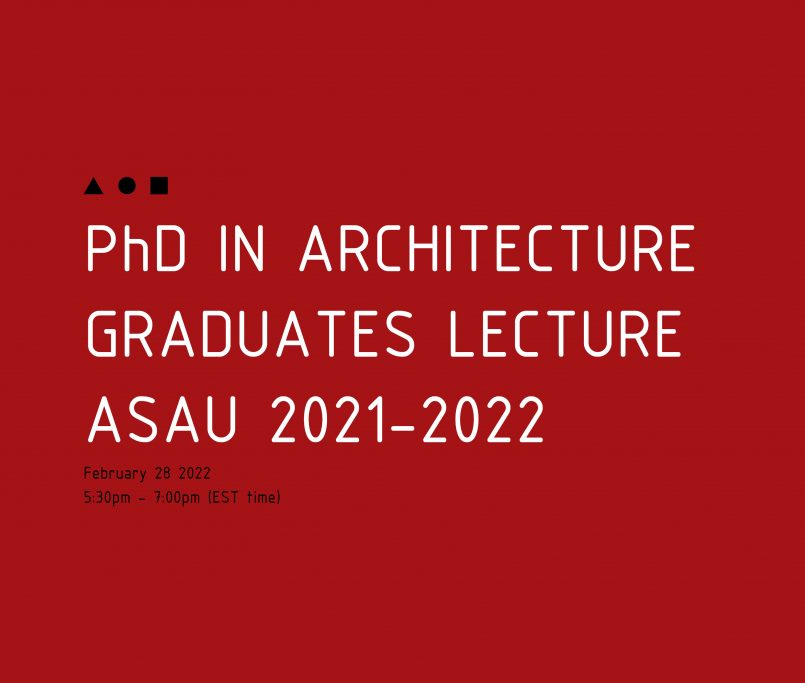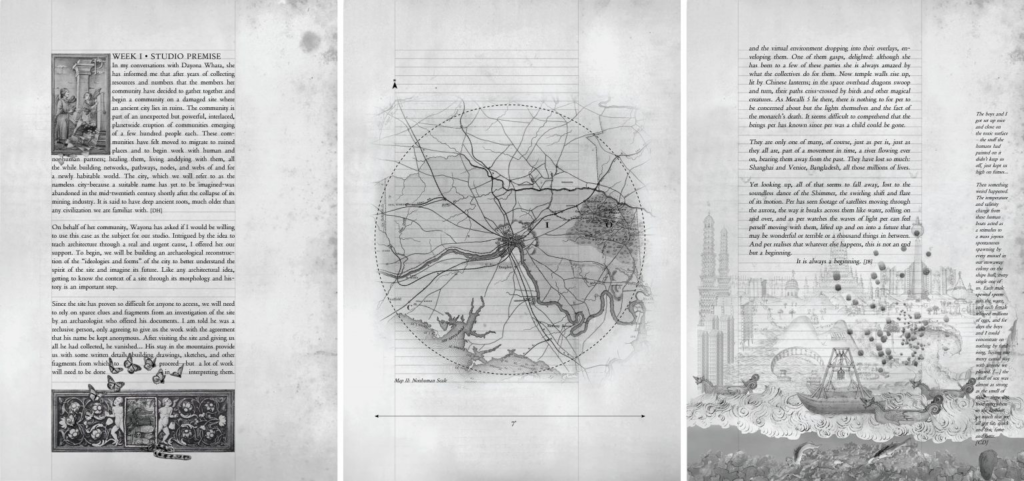PhD In Architecture Graduates Lecture
Monday, February 28, 2022 from 5:30 pm to 7:00 pm

- Virtual event
- Meeting link to follow
Location: Architecture Building and Zoom
Zoom link to come.
Everyone is invited to this event which will take place in-person at the school and on Zoom.
The following 2021 graduates of the Azriel School’s PhD in Architecture program will present their dissertations.

Jesse Rafeiro: Fiction as Pedagogy: Toward a De-Anthropocentric Architecture Education
5:30 p.m. to 6:00 p.m. ET
Critiquing anthropocentric biases of architecture, the research proposes a “de-anthropocentric” vector of ethical thinking through fiction as a form of pedagogy. Analyzing anthropocentrism as a broad spectrum, the research incorporates discourses of philosophy, education theory, anthropology, biology, and literature to challenge inherited biases of Western ontology and epistemology. Related to these aims, three modes of fiction are analyzed: the weird realism of Howard Phillips Lovecraft, the intergenerational multispecies worlding of Donna Haraway and the graphic portrayal of animal subjectivities in David Herman’s narratology beyond the human. Locating the early Renaissance as a period of major educational transition in architecture, the research re-invokes Filarete’s Libro architettonico (1461-63) as a pedagogical model for the present. Written as a continuous fictional dialogue disrupted by digressions into the environment, animals, anecdotes, fictional buildings, and social practices, the work offers a multifaceted educational model appropriate to question human-nonhuman relations. Between text and image, the work uses the literary device of a golden book to supply ancient literary wisdom throughout the educational journey. Following an analysis of Filarete, the dissertation presents a re-interpretation of the golden book as a contemporary pedagogical device to channel literature and other discourses into architectural education.

Pallavi Swaranjali: The Subjunctive Pause. The Nature of Architecture and its Representation in the Works of Indian Architect Balkrishna Doshi
6:00 p.m. to 6:30 p.m. ET
The dissertation studied three modes of architectural storytelling that Doshi adopted, namely, tectonic (through his buildings), visual (through his miniature painting style illustrations), and literary (through his written stories). Doshi’s built work and its representation created a “pause”- bringing in a re-orientation to present the invisible by offering a poetic and syncretic virtual world. This “pause” solicited engagement. The dissertation argues that the “pause” was a quality of architectural conceptualization, experience, and representation that imparted to his architecture a subjunctive character. It opened a space of translation between the author (architect) and the reader (users and others involved in the architectural creation).

Jorge Rivera Gutierrez: The Affective Threshold; or The Sensational Account of Place Through Film
6:03 p.m. to 7:00 p.m. ET
The dissertation is concerned with how filmmaking uses architectural atmospheres to frame a story and allow its characters to unfold fully in these emotional spaces, asking what architects may learn from the portrayal of architecture as a stage for fiction. The research deploys film hermeneutics, atmosphere theory, and phenomenology to propose that film is not only a visual medium but a conveyor of rich, haptic experiences. As such, it bears the capacity to speak to us about the poetic, emotional, and experiential richness of place and architectural atmospheres. Two key elements support this argument. First, a specific style of filmmaking — the school of slow cinema and the cinematic long take, as a way of engaging our emotions into the spatial experiences offered by film. Second, the house as a location, mainly as a place for grief and emotional reconstitution.